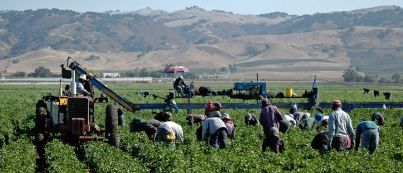New Obamacare rule roils CA farms, farmworkers
 The Affordable Care Act has long worried the California agricultural industry. But now the complaints have intensified because of a new requirement expanding coverage.
The Affordable Care Act has long worried the California agricultural industry. But now the complaints have intensified because of a new requirement expanding coverage.
Obamacare has largely been in effect for more than two years, but it wasn’t until Jan. 1 that employers with 50 to 99 employees were required to provide insurance. In 2015, the cutoff was 100 employees. This hits both farm labor contractors and smaller farmers who do their own hiring, who tend to have much less financial reserves than large agribusiness farms to fall back on to deal with additional costs and often smaller profit margins.
KQED looked at the issue last week:
Farm labor contractors who must now offer their workers health insurance are complaining loudly about the cost in their already low-margin business.
Some are also concerned that the forms they must file with the federal government under the Affordable Care Act will bring immigration problems to the fore: about half of the farm labor workforce in the U.S. is undocumented.
“There’s definitely going to be some repercussions to it,” says Jesse Sandoval, a farm labor contractor based in Stockton. “I think there’s going to be some things that cannot be ignored.”
Sandoval has about 100 workers on his payroll. When farmers need a crew to pick cherries or pumpkins or asparagus, they call him to send the workers. He needs to offer insurance this year, and he’s smarting at the price tag. At $300 a month per employee, he’s looking at a $30,000 monthly bill. … “The numbers aren’t there. My margin is 10 percent. And I have to increase expenses 10 percent? Well, that doesn’t work.”
Workers struggle with their share of cost
But under Obamacare, the cost of health insurance isn’t entirely borne by employers. The 2010 federal law allows requiring workers to pay up to 9.5 percent of their income to cover the coast of health premiums.
As with small farmers, that’s a cut on the margins that makes life rough for low-paid agricultural workers. As KQED notes …
… for farmworkers who pick oranges or peaches for $10 an hour, [the premium cost is] still too much.
Agostin Garcia says the two contractors he works for near Fresno offered him insurance directly. But when he saw the price tag, he turned them both down.
“For me, I’m the only one in my house who works. There’s five of us in the family,” he says in Spanish. “It just wouldn’t work. Either I pay for health insurance, or I pay the rent and utilities.”
Grim quality of life for farmworkers
And that rent is often for housing that is in awful condition, according to a 2014 report by the California Rural Legal Assistance group. In These Times offered this summary:
Even today, however, surveys and field reports have revealed that a large portion of workers are squeezed into essentially unlivable spaces. Some dilapidated apartments and trailer parks lack plumbing or kitchen facilities, much less any modicum of privacy; others are exposed to toxic pesticide contamination or fetid waste dumps.
Workers can “live in a single-family dwelling with perhaps a dozen to 20 [people] crowding in,” [report author Don] Villarejo says. In some residences, “mattresses are lined up against the wall because during the daylight hours you could not be able to walk through the rooms owing to all the mattresses on the floor at that time.”
Though premium costs may strain the budget of impoverished farmworkers’ families, the Affordable Care Act retains the passionate support of the United Farmworkers Union as a huge improvement over previous health insurance programs for agriculture workers.
Former UFW Vice President Dolores Huerta has used 2016 Republican presidential candidates’ opposition to Obamacare to argue this shows they hate Latinos — to the annoyance of one of California’s most prominent Latino journalists, Carlsbad-based Ruben Navarrette Jr., an unpredictable moderate whose syndicated column is carried by the Washington Post Writers Group.
Chris Reed
Chris Reed is a regular contributor to Cal Watchdog. Reed is an editorial writer for U-T San Diego. Before joining the U-T in July 2005, he was the opinion-page columns editor and wrote the featured weekly Unspin column for The Orange County Register. Reed was on the national board of the Association of Opinion Page Editors from 2003-2005. From 2000 to 2005, Reed made more than 100 appearances as a featured news analyst on Los Angeles-area National Public Radio affiliate KPCC-FM. From 1990 to 1998, Reed was an editor, metro columnist and film critic at the Inland Valley Daily Bulletin in Ontario. Reed has a political science degree from the University of Hawaii (Hilo campus), where he edited the student newspaper, the Vulcan News, his senior year. He is on Twitter: @chrisreed99.
Related Articles
CalWatchdog Morning Read – November 2
Democrats abandon incumbent assemblywoman Will closing of nuclear plant spur fossil fuel use? Another Democrat jumps in 2018 race for
‘Mayor Steinberg’ a disaster-in-waiting for Sacramento
July 10, 2013 By Katy Grimes Sacramento’s City Council has historically been a revolving door into state politics. Do the
CalWatchdog Morning Read – Election Day
How much would a Democratic supermajority in Sacramento matter legislatively? What races we’re watching Cultural significance of California’s U.S. Senate race



